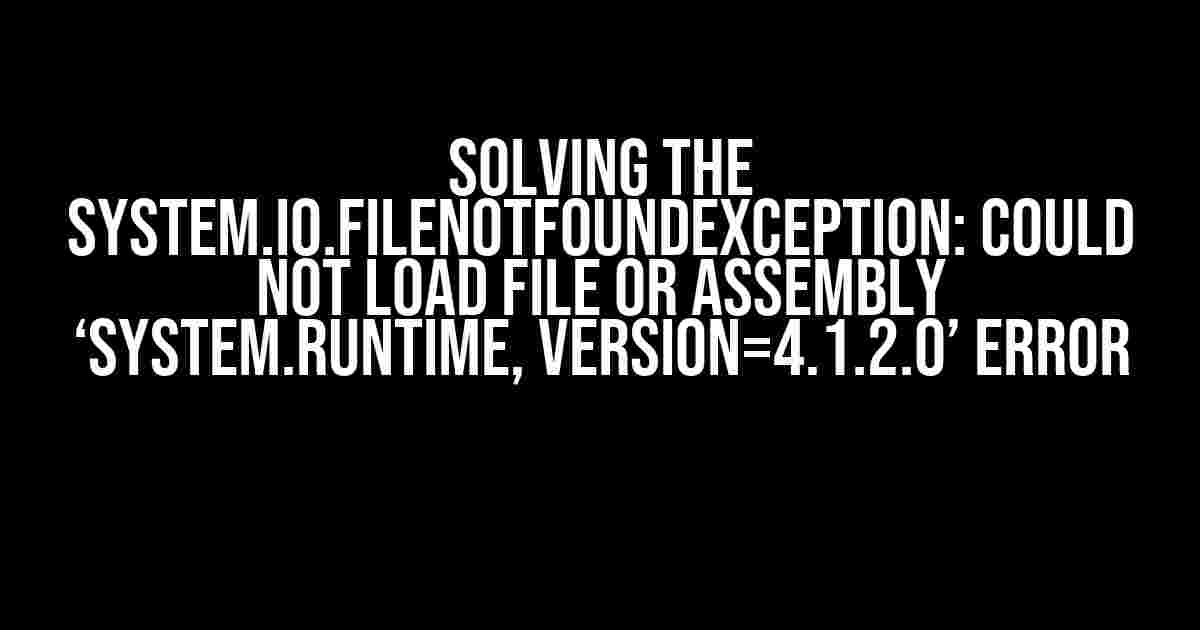If you’re reading this, chances are you’ve stumbled upon a frustrating error message that’s got you scratching your head. The infamous “System.IO.FileNotFoundException: Could not load file or assembly ‘System.Runtime, Version=4.1.2.0′” error has a way of rearing its ugly head at the most inopportune moments. Don’t worry, friend, you’re not alone! We’re about to embark on a journey to conquer this error once and for all.
Understanding the Error
Before we dive into the solutions, let’s take a step back and understand what’s causing this error. The “System.IO.FileNotFoundException” is a type of exception that occurs when the .NET runtime is unable to locate a specific assembly (in this case, ‘System.Runtime, Version=4.1.2.0’). This assembly is part of the .NET Framework and is required for many applications to function properly.
There are several reasons why this error might occur, including:
- Corrupted or missing assembly files
- Incorrect .NET Framework version
- Assembly conflicts between different versions
- Incorrect project configuration
- Missing NuGet packages
Solution 1: Verify .NET Framework Version
The first step in resolving this error is to ensure that you’re running the correct version of the .NET Framework. To do this, follow these steps:
- Open the “Control Panel” on your computer
- Click on “Programs and Features” (in Windows 10/8) or “Programs” (in Windows 7)
- Look for “Microsoft .NET Framework” in the list of installed programs
- Make sure you have version 4.6.1 or higher installed
- If you don’t have the correct version installed, download and install it from the Microsoft website
Solution 2: Check Assembly Files
Next, let’s investigate the assembly files themselves. Sometimes, these files can become corrupted or go missing. To check for any issues, follow these steps:
- Open the “File Explorer” and navigate to the directory where your project is located
- Look for the “System.Runtime” assembly file (it should be in the “bin” or “obj” folder)
- Check the file’s properties to ensure it’s the correct version (4.1.2.0)
- If the file is corrupted or missing, try reinstalling the NuGet package (more on this later)
Solution 3: Update NuGet Packages
NuGet packages are a common source of errors, especially when it comes to assembly conflicts. To update your NuGet packages, follow these steps:
- Open your project in Visual Studio
- Right-click on your project in the “Solution Explorer” and select “Manage NuGet Packages”
- In the “Manage NuGet Packages” window, click on “Updates” and check for any updates available
- Update any outdated packages, including the “System.Runtime” package
Solution 4: Clean and Rebuild Your Project
Sometimes, a simple clean and rebuild can resolve the issue. To do this, follow these steps:
- Open your project in Visual Studio
- Click on “Build” in the top menu and select “Clean Solution”
- Wait for the clean process to complete
- Click on “Build” again and select “Rebuild Solution”
- Wait for the rebuild process to complete
Solution 5: Check Project Configuration
Incorrect project configuration can also cause this error. To check your project configuration, follow these steps:
- Open your project in Visual Studio
- Right-click on your project in the “Solution Explorer” and select “Properties”
- In the “Properties” window, click on the “Application” tab
- Make sure the “.NET Framework” version is set to 4.6.1 or higher
- Also, ensure that the “Target framework” is set to the correct version
Solution 6: Use the Fusion Log Viewer
The Fusion Log Viewer is a powerful tool that can help you diagnose assembly loading issues. To use the Fusion Log Viewer, follow these steps:
- Download and install the Fusion Log Viewer from the Microsoft website
- Open the Fusion Log Viewer and click on “Settings” in the top menu
- In the “Settings” window, select the “Log bind failures to disk” option
- Click “OK” to save the changes
- Run your application again and reproduce the error
- Open the Fusion Log Viewer and analyze the log files to identify the assembly loading issue
Conclusion
And there you have it, folks! With these six solutions, you should be able to resolve the “System.IO.FileNotFoundException: Could not load file or assembly ‘System.Runtime, Version=4.1.2.0′” error. Remember to be patient and methodical in your approach, and don’t be afraid to try a combination of solutions if the first one doesn’t work.
Troubleshooting Tips
Here are some additional troubleshooting tips to keep in mind:
- Check the Event Viewer for any error messages related to the assembly
- Use the Process Monitor to monitor the assembly loading process
- Check for any conflicts with other assemblies or DLLs
- Try running your application on a different machine or environment
| Error Code | Description |
|---|---|
| System.IO.FileNotFoundException | Occurs when the .NET runtime is unable to locate a specific assembly |
// Example code snippet demonstrating the use of the System.Runtime assembly
using System.Runtime.CompilerServices;
public class MyClass
{
public int MyMethod()
{
return 42;
}
}
By following these solutions and troubleshooting tips, you should be able to resolve the “System.IO.FileNotFoundException: Could not load file or assembly ‘System.Runtime, Version=4.1.2.0′” error and get your application up and running smoothly. Happy coding!
Frequently Asked Question
Get the answers to the most pressing questions about “System.IO.FileNotFoundException: Could not load file or assembly ‘System.Runtime, Version=4.1.2.0”
What is the error “System.IO.FileNotFoundException: Could not load file or assembly ‘System.Runtime, Version=4.1.2.0”?
This error occurs when your .NET application is unable to find the required assembly ‘System.Runtime, Version=4.1.2.0’ at runtime. This assembly is part of the .NET Framework and is required for your application to function properly.
What causes this error to occur?
This error can occur due to various reasons such as incorrect NuGet package configuration, missing or corrupted assembly files, or incorrect .NET Framework version installed on the system.
How do I resolve this error?
To resolve this error, try reinstalling the required NuGet packages, ensure that the correct .NET Framework version is installed, and verify that the assembly files are present in the correct location. You can also try cleaning and rebuilding your project to ensure that all dependencies are properly resolved.
Is this error specific to a particular .NET Framework version?
Yes, this error is specific to .NET Framework version 4.6.1 and later. The ‘System.Runtime, Version=4.1.2.0’ assembly is introduced in .NET Framework 4.6.1, so applications targeting earlier versions will not encounter this error.
Can I ignore this error and continue with my application development?
No, it’s not recommended to ignore this error. The ‘System.Runtime, Version=4.1.2.0’ assembly is a crucial component of the .NET Framework, and ignoring the error may lead to unexpected behavior or crashes in your application. It’s essential to resolve the error to ensure the reliability and stability of your application.


